Posts Tagged ‘Labor Rights’ (29 found)
Activist Su Su Nway Arrested for Trespassing
RANGOON — Labor rights activist Su Su Nway was arrested on Thursday on charges of trespassing in relation to her support for farmers claiming their lands had been seized by the military […]
• • •Finnwatch Researcher Andy Hall Trial in Thailand: Charge is Dismissed due to Unlawful Interrogation Process
The Prakanong Court in Bangkok dismissed defamation charge brought against Andy Hall by Natural Fruit Company Ltd, a pineapple export factory. Natural Fruit has launched multiple criminal and civil prosecution against the researcher and activist since February 2013 as a result of his contribution to a Finnwatch report published in 2013. The report revealed serious human rights violations at Natural Fruit’s pineapple juice production facilities […]
• • •World Bank Should Promote Human Rights in Burma, NGOs Say
RANGOON — Human Rights Watch (HRW) and Burmese civil society organizations have urged the World Bank Group to put human rights at the center of its new Burma country strategy.
They said the bank should encourage an improvement in respect for rights within the Burmese government, while also ensuring that its development projects do not exacerbate ethnic conflict and the land rights’ situation […]
• •20 Injured in Clash with Police at Closed Korean factory
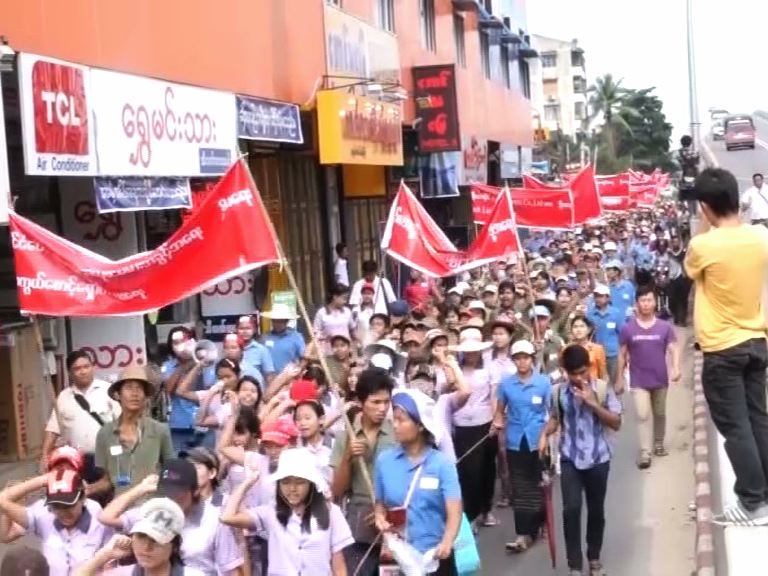 About 20 former employees of the now defunct Master Sports footwear factory were injured during a standoff with police after they held an official captive at the facility on Tuesday.
About 20 former employees of the now defunct Master Sports footwear factory were injured during a standoff with police after they held an official captive at the facility on Tuesday.
A group of workers came to the Rangoon factory on 16 September to negotiate with representatives of the Department of Labour, which was tasked with carrying out an August court ruling that the workers should receive compensation for sudden dismissal […]
• •Thai Industry Commits to Support Bail Out
On Wed. 18th June at 9am, British migrant rights activist Andy Hall,
who campaigns to improve conditions for migrant workers in Thailand,
will be escorted from Bangna police station, Bangna district, Bangkok
by police officers to meet officials at the Prakanong Public Prosecutors Office, Bangkok to learn the public prosecutor?s decision whether the latest criminal charges filed against him by Natural Fruit Co. Ltd. will be ordered prosecuted at Prakanong district court […]
Children for Hire: A Portrait of Child Labor in Mon Areas
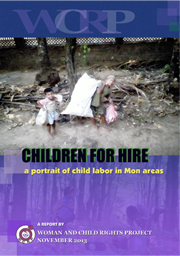 The growing domestic and international attention being paid to child labor in Burma, also known as Myanmar, signals a vital step in the country’s reform and development process. The advent of new funding to research the scope of the problem, proposed amendments to labor laws, and popularized documentaries exposing the lives of working children have indicated fresh interest in revealing and reducing the incidence of child labor.
The growing domestic and international attention being paid to child labor in Burma, also known as Myanmar, signals a vital step in the country’s reform and development process. The advent of new funding to research the scope of the problem, proposed amendments to labor laws, and popularized documentaries exposing the lives of working children have indicated fresh interest in revealing and reducing the incidence of child labor.
However, the catalyst for this report was sparked by observations that these proliferating activities and discussions are often largely restricted to urban areas, particularly regarding the well-known prevalence of Burma’s “teashop boys.” While urban forms of child labor warrant immediate and effective interventions, the ambiguity that shrouds less visible forms of the practice, especially occurring in rural ethnic villages and communities tucked against the country’s vast borderline, necessitates targeted illumination. During several interviews conducted for this report, civil society members and child protection officers described child labor in Burma as vastly under-researched, and said that accurate data from the country’s peripheral areas is almost nonexistent […]
WCRP Releases “Children for Hire” to Mark Universal Children’s Day
The Woman and Child Rights Project (WCRP) has released its report, “Children for Hire: A portrait of child labor in Mon areas,” to illustrate the incidence of child labor in rural Mon communities and along Burma’s eastern border. Drawn from 67 interviews conducted with working children and their families, health workers, public sector and civil society members, and child protection officers, the report aims to elevate the voices of underage workers and expose the less visible forms of child labor that exist outside of urban settings […]
• • •Modern Slavery in Rangoon’s Industrial Zones
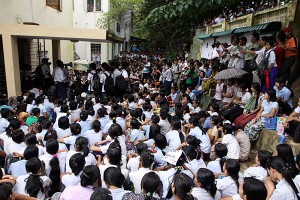 On 14 November, a group of labor organizations and unions released the English language version of ‘Modern Slavery: A Study of Labour Conditions in Yangon’s Industrial Zones 2012-2013’. The Burmese language version was released in Rangoon on 30 October. Research into the abysmal living and working conditions in the main industrial zones of Rangoon, including Hlaingtharyar, was undertaken by Labor Rights Clinic, Cooperation Programme of Independent Labourers, Construction-based Labour Union and Workers Support Group, as well as other labor unions and activists who wish to remain anonymous.
On 14 November, a group of labor organizations and unions released the English language version of ‘Modern Slavery: A Study of Labour Conditions in Yangon’s Industrial Zones 2012-2013’. The Burmese language version was released in Rangoon on 30 October. Research into the abysmal living and working conditions in the main industrial zones of Rangoon, including Hlaingtharyar, was undertaken by Labor Rights Clinic, Cooperation Programme of Independent Labourers, Construction-based Labour Union and Workers Support Group, as well as other labor unions and activists who wish to remain anonymous.
The report underscores the many challenges that workers face in their daily lives. The typical basic wage is around US$25-US$37 per month, leaving workers little choice but to work an average 11 hours per day, 6 days per week, just to make ends meet. Many, who fail to earn enough to cover their monthly living expenses, turn to pay-day lenders, thereby trapping them in a vicious cycle of debt. A complex system of bonuses, as well as the need for overtime, means that any time taken for sickness or holiday, anything other than 100% punctuality, or any perceived under-performance, means that employers can dock significant amounts of workers’ monthly wages. The report also finds that sanitation and health standards are generally inadequate, that many people live in dirty overcrowded, factory-provided hostels, that women face sexual harassment traveling to and from work, and that factory supervisors are often harsh and ruthless […]
• • •Modern Slavery: A Study of Labour Conditions in Yangon’s Industrial Zones
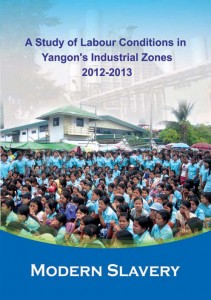 With Myanmar going through a period of transition and the space for civil society is expanding, the role of labour unions in promoting and protecting fundamental rights of workers is vital yet the challenges they face in the current environment are huge.
With Myanmar going through a period of transition and the space for civil society is expanding, the role of labour unions in promoting and protecting fundamental rights of workers is vital yet the challenges they face in the current environment are huge.
Workers in Yangon’s 13 industrial zones work in unsafe, hot, overcrowded factories, typically for around 11 hours per day […]
Strike at Garment Factory Enters Second Week
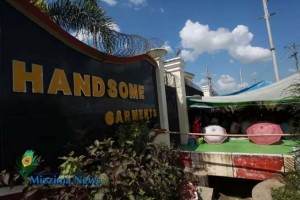 Workers at a Yangon garment factory have entered the second week of a strike called over the sacking of a colleague and the installation of CCTV cameras near a women’s toilet.
Workers at a Yangon garment factory have entered the second week of a strike called over the sacking of a colleague and the installation of CCTV cameras near a women’s toilet.
The strike by about 200 workers at the ‘Handsome’ factory in Dagon Seikkan township began on October 26 after the sacking of their colleague,Sithu Min,who was reportedly accused by management of refusing to work overtime […]









 All posts
All posts